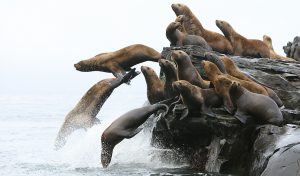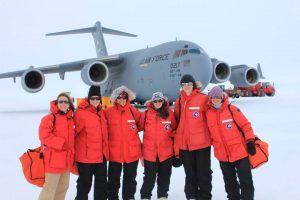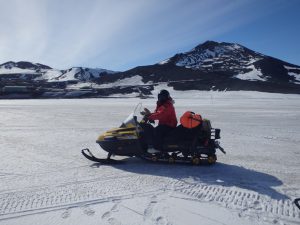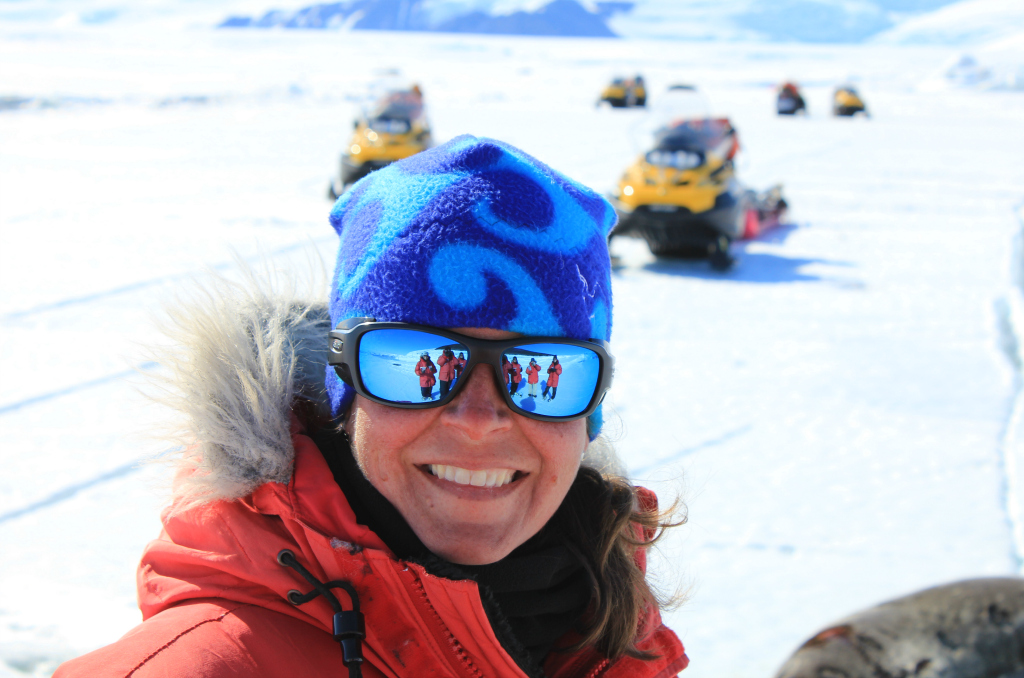Julie Avery has a life that many science geeks would envy.
She’s a research assistant professor with joint appointments at the University of North Florida in Jacksonville and the University of Alaska Fairbanks. She runs a laboratory at each university and shuttles between Alaska and Florida, spending three to six months at each location before flying off to the other corner of the continent.
But back in the late 1990s, Julie Avery was just another Valencia student, trying to figure out what she wanted to do with her life.
“My time at Valencia was incredibly valuable. I had these amazing profs who were so passionate about science and that helped invigorate me in terms of what I wanted to do,” says Avery. “Once I got to UCF, I happened to start working for a professor who was doing marine mammal research, Dr. Lorrie Rea. She was only there a short time, but I always joke that she was there for me.”
When she transferred to UCF, Avery wanted to help a professor conduct scientific research – in part, to help her learn because she has a learning disability.
“At UCF, I started knocking on doors. Because I have a learning disability – dyslexia — I knew that my learning style was different and I knew I had to have hands-on work to understand what I was learning in class,” she said.
“So I looked at the websites and CVs of all the professors in the biology department and chose three professors. I knocked on their doors and told them I wanted to do research. One said she was interested, and didn’t have any spots in her lab. And then Lorrie (Rea) said she’d take me.”
For Avery, working in Rea’s lab was life-changing. Rea, who worked at UCF from 1998 to 2000, was studying the metabolism and blood chemistry of sea lions and seals, so she made space in her lab for Avery.

“It made all the difference in the world,” she says. “I really struggled in school for the first couple of years. But once I started doing the research and doing hands-on work, it changed my life and I realized that I could go to graduate school.”
And it cemented her decision to do biological research. “I fell in love with research and decided that was the direction I wanted to go in,” says Avery, now 40.
While she’s passionate about conducting biological research, she’s equally passionate about helping students discover what fields inspire them.
“As a professor, I’m always trying to help students find what they’re passionate about,” says Avery. “You have to have the passion to get the drive to get through those challenging classes or those tough situations that you may face in your career.”
But she also says students shouldn’t give up too early. “Just because something’s challenging you, doesn’t mean it’s not for you,” she added. “But if you’re not passionate about it, then it’s going to be difficult to get through those difficult times.”

While she was at UNF, she taught anatomy and physiology and many of her students were nursing majors. “I was teaching people who were going into nursing, but many of them didn’t want to touch people, didn’t want to deal with icky fluids or they didn’t like anatomy and physiology. If you’re going to be in a field for 30 years, you have to have the passion and the drive to do this and, if you don’t, you need to re-evaluate and re-think where you are.”
But like many college students, Avery had to figure out her career goal.
“I’m a trial and error person. In high school, I got involved in the medical academy, because I thought I wanted to be a doctor. But that wasn’t my passion. Then I started working in a veterinary clinic and I loved it. I loved the intrigue: Your patients can’t tell you what’s wrong, so you have to figure out what’s wrong. That’s where things got started for me.”
However, her path to veterinary school got derailed a little when her Valencia professors described the scientific research they conducted each summer or research they’d done earlier in their careers, That’s when a light bulb went off in Avery’s head. “I realized I didn’t have to be a vet or doctor to do medical-type research.” For her, research “was the fun part of science.”
Today, Avery is a research assistant professor with joint appointments at the University of North Florida in Jacksonville and the University of Alaska Fairbanks. She runs a laboratory – and oversees a small team of graduate students – at each university and shuttles between Alaska and Florida, spending three to six months at each location before flying off to the other corner of the continent.
In Florida, she and her team are studying the hormones and endocrine development of marine mammals — and monitoring the species to see how climate change is affecting them. In Alaska, she is currently focusing on levels of mercury and other contaminants that sea lions and other marine mammals are exposed to – and how their bodies are coping with what should be toxic levels of mercury.
Avery, who went to high school in Titusville, has traversed the far reaches of the continental United States. After earning her bachelor’s degree in biological sciences at UCF, she earned a master’s degree at the University of Alaska Anchorage and then did her doctoral work at the University of Connecticut.
And for a kid who was always intrigued by her grandparents’ tales of Connecticut relatives who were whaling ship captains – and a distant cousin who was an explorer in Antarctica – working at both the north and south poles has been a dream come true.

“I’d always been fascinated, hearing these stories of these explorers and these extreme environments. My dream was to go to Antarctica and I was able to do that three years ago” on a research expedition to McMurdo Station, where she saw a portrait of her distant cousin, Nat Palmer. “He was actually a seal hunter and an explorer and I’m a seal conservationist.”
“I’ve been fortunate to do work on three continents and exploring some amazing places,” she says. “It’s probably a little bit in my genes.”
